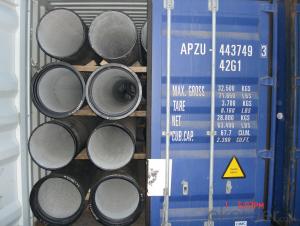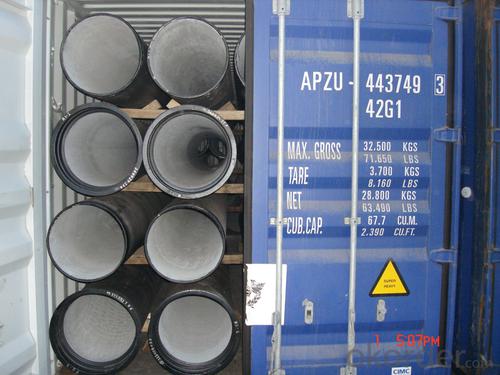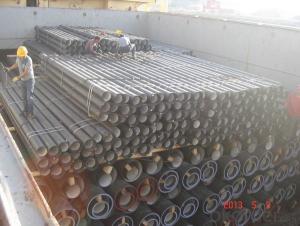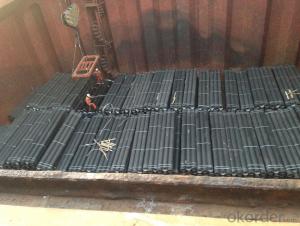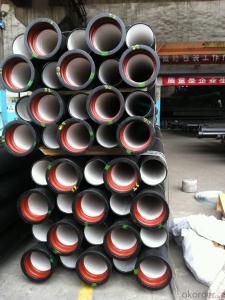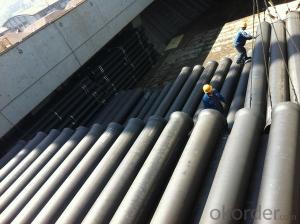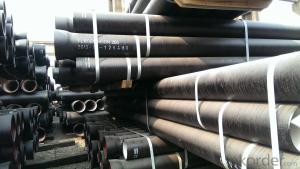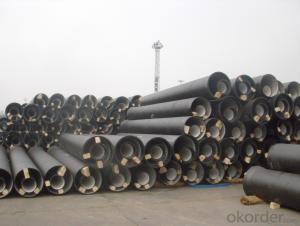ductile iron pipe DN500 K8 SOCKET SPIGOT PIPES
- Loading Port:
- Tianjin
- Payment Terms:
- TT OR LC
- Min Order Qty:
- 25
- Supply Capability:
- 30000 /month
OKorder Service Pledge
OKorder Financial Service
You Might Also Like
1) The standard of pipe: ISO2531:1998, EN545:2006,K9 K8
2) Effective length: 6m/5.7m
3) Inner cement line: Portland cement lineas per ISO4179
4) Zinc coating: at least 130g/m2 as per ISO8179
5) Bitumen painting: at least 70μm as per ISO8179
6)With 102% quantity of NBR, SBR, or EPDM ring asper ISO4633
7) DN80-DN1200
8) Highstrength, lighter than grey iron, good corrosion resistance, no furring, smallflow resistance, easy fixing, long life tome about 100 yeas
9)Checked by automatic inspection equipment
10) Composition:
Chemical composition | |||
Chemical composition | Ductile Cast Iron Pipe (%) | Grey iron pipe (%) | Steel pipe (%) |
C | 3.5-4.0 | 3.2-3.8 | 0.1-0.2 |
Si | 1.9-2.6 | 1.4-2.2 | 0.15-0.4 |
Mn | 0.15-0.45 | 0.4-0.6 | 0.3-0.6 |
P | ≤0.06 | ≤0.3 | 0.02-0.03 |
S | ≤0.02 | ≤0.1 | 0.02-0.03 |
Mg | 0.03-0.06 |
|
|
11) Feature:
Mechanical properties | |||
| Ductile Cast Iron Pipe | Grey Iron Pipe | Steel Pipe |
Tensile Strength(Mpa) | ≥420 | 150-260 | ≥400 |
Yield Strength(Mpa) | ≥300 | No Confirmation | No Confirmation |
Bending Strength(Mpa) | ≥590 | 200-360 | ≥400 |
Elongation (%) | ≥10 | Neglected | ≥18 |
Brinell Hardness(HBS) | ≤230 | ≤230 | About 140 |
12) T type mechanical joint
13) Packing: in bulk or container
PACKING: 1) Pipesare bundled together with the steel belt.
2) Wooden pieces are put between the pipes.
- Q: Can ductile iron pipes be used for underground steam distribution systems?
- Yes, ductile iron pipes can be used for underground steam distribution systems. Ductile iron is a type of cast iron that has been treated with magnesium to make it more flexible and resistant to cracking. This makes it suitable for use in underground applications where the pipes may need to withstand high pressure and temperature conditions, such as in steam distribution systems. Ductile iron pipes have excellent strength and durability, which makes them capable of handling the extreme conditions associated with steam distribution. Additionally, their corrosion resistance properties make them a reliable choice for long-term use in underground environments. However, it is important to note that proper insulation should be used to prevent heat loss and ensure the efficiency of the steam distribution system.
- Q: Are ductile iron pipes suitable for power plant applications?
- Yes, ductile iron pipes are suitable for power plant applications. Ductile iron is a type of cast iron that has enhanced strength, durability, and flexibility compared to traditional cast iron pipes. These properties make ductile iron pipes ideal for power plant applications where they are exposed to high pressure, extreme temperatures, and corrosive environments. Power plants often require a reliable and robust piping system to transport various fluids such as water, steam, and chemicals. Ductile iron pipes have high tensile strength and can withstand high pressure, ensuring the safe and efficient flow of these fluids within a power plant. Their ability to handle high-pressure steam makes them particularly suitable for power generation applications. Additionally, ductile iron pipes have excellent resistance to corrosion, which is crucial in power plants where many fluids can be highly corrosive. The internal and external linings of these pipes protect them from corrosion, ensuring a longer service life and reducing maintenance costs. This corrosion resistance also makes them suitable for transporting chemicals and wastewater within a power plant. Another benefit of ductile iron pipes is their ability to withstand extreme temperatures. Power plants often operate at high temperatures, and ductile iron pipes can handle these conditions without compromising their structural integrity. They have a high melting point and can resist thermal expansion and contraction, making them suitable for applications involving hot fluids and steam. Furthermore, ductile iron pipes are cost-effective compared to other materials commonly used in power plants, such as stainless steel or carbon steel. They offer a balance between performance and cost, making them an attractive choice for power plant applications. In conclusion, ductile iron pipes are well-suited for power plant applications due to their strength, durability, flexibility, corrosion resistance, and ability to withstand high pressures and extreme temperatures. Their cost-effectiveness further adds to their suitability for power plant piping systems.
- Q: How do ductile iron pipes perform in cold weather conditions?
- Ductile iron pipes perform well in cold weather conditions due to their exceptional strength and durability. Unlike other materials, ductile iron pipes have a high resistance to freeze-thaw cycles, preventing them from cracking or breaking in freezing temperatures. Additionally, the material's flexibility allows for minimal expansion and contraction, ensuring stability even in extreme cold. Overall, ductile iron pipes are a reliable choice for cold weather environments.
- Q: What are the specifications for the installation of water ball iron pipes?
- The T type interface pipe shall be supported by a pier in the vertical or horizontal direction. The size of the pier should be calculated according to the factors such as pipe diameter, angle of rotation and working pressure. 4, the transmission of drinking water, the pipeline should not pass through the poison contaminated areas, such as the need to pass through, should take protective measures.
- Q: Are ductile iron pipes suitable for use in saltwater environments?
- Yes, ductile iron pipes are suitable for use in saltwater environments. Ductile iron is highly resistant to corrosion and can withstand the corrosive effects of saltwater, making it a reliable choice for piping systems in such environments.
- Q: Do ductile iron pipes require concrete encasement for support?
- Yes, ductile iron pipes typically require concrete encasement for support. Concrete encasement provides additional stability and strength to the pipes, preventing them from shifting or collapsing under pressure. It helps distribute the load evenly along the length of the pipe and protects it from external forces such as soil movement or heavy vehicle traffic. Concrete encasement also helps to minimize the risk of damage due to corrosion or external impacts, ensuring the longevity and durability of the ductile iron pipes.
- Q: How do ductile iron pipes perform in high-traffic areas?
- Ductile iron pipes perform well in high-traffic areas due to their durability and strength. They have the ability to withstand heavy loads and traffic loads without experiencing deformation or damage. Additionally, their corrosion resistance properties make them suitable for prolonged exposure to moisture and harsh environmental conditions. Overall, ductile iron pipes are a reliable choice for high-traffic areas.
- Q: How many casting methods are there in ductile iron casting? A 60*6 discus can not have sand holes. Its surface is smooth. What process can be used to make it?
- The metal mould is ok! The surface quality of the casting is better than that of the sand mold. But later heat treatment is needed.
- Q: Can ductile iron pipes be used for water treatment facilities?
- Yes, ductile iron pipes can be used for water treatment facilities. Ductile iron pipes are known for their strength, durability, and corrosion resistance, making them suitable for transporting water in various treatment processes such as filtration, disinfection, and distribution. Their ability to withstand high pressures and external loads makes them a reliable choice for water treatment facilities.
- Q: Can ductile iron pipes be used for dam construction?
- Yes, ductile iron pipes can be used for dam construction. Ductile iron pipes are known for their durability, strength, and corrosion resistance, making them suitable for various applications including dam construction. These pipes can withstand high pressure and are capable of handling the water flow required for dam operations. Additionally, their flexibility allows for easy installation and maintenance, making them a viable choice for constructing dams.
Send your message to us
ductile iron pipe DN500 K8 SOCKET SPIGOT PIPES
- Loading Port:
- Tianjin
- Payment Terms:
- TT OR LC
- Min Order Qty:
- 25
- Supply Capability:
- 30000 /month
OKorder Service Pledge
OKorder Financial Service
Similar products
Hot products
Hot Searches
Related keywords
